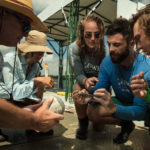UWF supports Florida’s knowledge-based economy
The Board of Governors of the State University System of Florida has a clear vision: to create a new Florida economy based on knowledge and innovation. Its proposed plan, called “New Florida,” offers to restructure Florida’s economic reliance on tourism, agriculture and growth and heralds the role that universities play as economic drivers of a knowledge-based economy. By doubling the investment of recurring state dollars in Florida’s 11 public universities, “New Florida” stands to transform Florida’s economy.
In March, the University of West Florida Board of Trustees and Student Government Association adopted resolutions in support of the plan. UWF’s Faculty Senate also supports “New Florida.” A joint letter was issued to the campus community by UWF President Judith Bense and Faculty Senate President Richard Platt in order to bring attention to the benefits the plan has for the state of Florida.
“This plan has the potential to transform UWF and our region,” said Bense. “For UWF, ‘New Florida’ would specifically mean new revenue to hire additional faculty, provide an increase in services to students, support staff, maintain smaller class sizes and encourage research. In turn, our region will benefit from the quality of graduates and research.”
“New Florida” will focus half of the new funding on targeted degrees, such as science, technology, engineering and math programs and the other half on developing a pool of graduates with degrees needed for regional and statewide development (business, nursing, computing, construction, architecture, education, etc.). Several programs at UWF potentially could benefit from this funding, such as the post-baccalaureate pre-professional preparation program (P4 Program) and programs housed in the School of Science and Engineering.
Michael Murdoch, Chief Executive Officer for Gulf Breeze-based AppRiver, one of the fastest growing small-tech companies in the United States, understands the benefit of investing in the university. His company employs several UWF graduates and relies on the university as a rich source of talent.
“Local technology enterprises benefit immensely from UWF’s undertakings,” he said. “UWF provides a robust recruitment pool and helps fill jobs that require strong technology skills.”
Beyond the creation of a quality work force, universities are large economic engines. UWF’s impact on the regional economy is estimated at $650 million annually in total consumer and business spending. For every $1 invested in higher education, $9.72 returns to the local economy.
“Supporting talent, research and discovery will lead to high-tech, high-wage jobs,” said K.C. Clark, chair of the UWF Board of Trustees. “Now is the time to invest in education.”
For more information about the “New Florida” plan, visit http://www.uwf.edu/president/documents/New_Florida.pdf.


